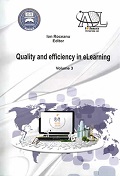E-LEARNING COURSE FOR PATTERNED KNITTED FABRICS
E-LEARNING COURSE FOR PATTERNED KNITTED FABRICS
Author(s): Mirela Blaga, Ana-Ramona CiobanuSubject(s): Education
Published by: Carol I National Defence University Publishing House
Keywords: Computer aided design; cable knitted fabrics; interactive lesson; self assessment
Summary/Abstract: Among textile technologies, knitting is one of the most excited one, due to its huge potential for various applications, from fashion to technical ones. The field of the computerized flat knitting machines in a dynamic one stimulated by the continuous technical developments and software solutions, available on the market, in order to provide flexibility of the product design and manufacturing processes. Hence, the education in textiles must be strong correlated with the industry level and requirements for high qualified personnel. The paper presents an interactive technical lesson, developed by using the “Storyline” software package to edit the technical content of the Computer Aided Design lecture. The paper is related to some complex knitted patterns named “cables” which require specific technical conditions to be manufactured. Cables are based on well defined technological actions of the knitting machines, such as: loop transfer, needle racking, cast off stitches, and the quality of the patterns depend on their precision. On the other hand, this activity is blended with the programmer experience and knowledge about the machine mechanisms and settings, gathered from the continuous work on the computer and knitting machine. The lecture is conducted by a virtual tutor who provides detailed explanations concerning the associated images, videos and knitting stages simulation of the lesson. A self-assessment stage of the knowledge acquired during the course is completing the e-learning content, by using interactive tests based on ‘drag-and-drop” and “multiple choice” methods. This is an important stage, reflecting the knowledge level, before applying them on the machine.
Journal: Conference proceedings of »eLearning and Software for Education« (eLSE)
- Issue Year: 9/2013
- Issue No: 03
- Page Range: 414-421
- Page Count: 8
- Language: English

